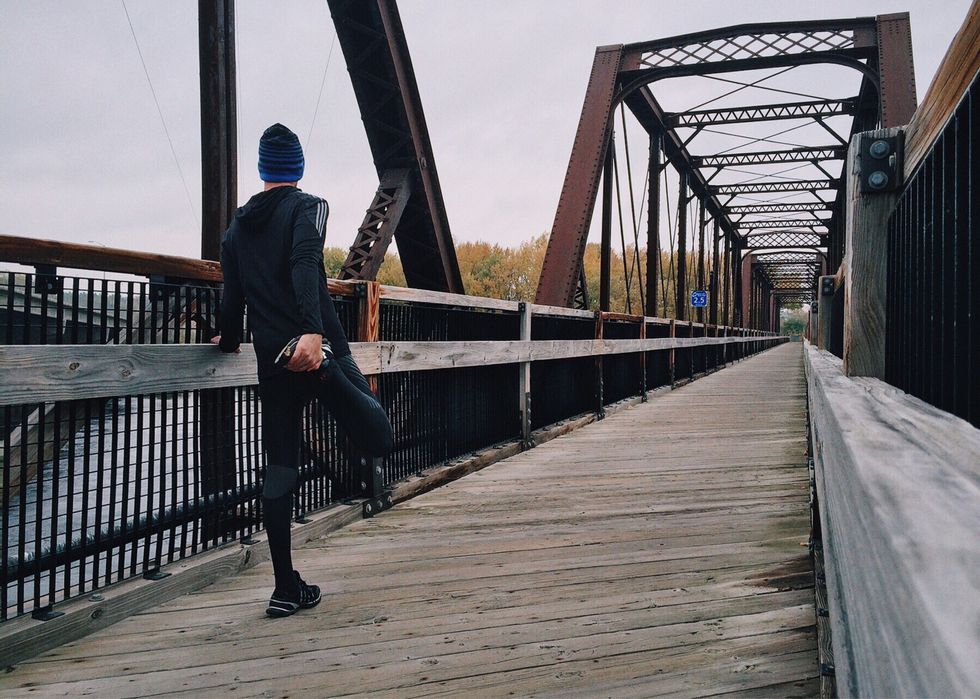Running is damn tough in general, not to mention in winter when days are short and you've got to bundle up in order to survive the savage cold. Don't worry though - as someone who successfully runs a minimum of five times in heat and frost, I've got some tips for you to use right now and make your life easier.
1. Prepare the night before
Preparation is the key to success for just about anything, including running. If you find it hard to say goodbye to your cozy bed in the morning, prepare for running the night before. Put on your running clothes and sleep in them - it's that simple.
You'll wake up way more prepared as your subconscious will be swayed into thinking that you've already accomplished the run. My attire of choice is a warm, quality hoodie, well-fitting leggins to insulate my legs from the cold, and a cold-blocking shirt.
The one part of my body I leave uncovered are my feet, as they actually get warm quicker and better when you're not wearing socks.
2. Spice up the run
Running can be very monotonous which takes all the fun out of it and sets you up for failure. I always spice up my runs (especially in winter) by adding other exercises into the run. This is what you can do: run for 1 mile, then pause and do 10 jump squats. Continue running and once you finish mile number two, pause and do 10 lunges on each side.
You can pick whichever resistance exercises your body enjoys doing. The point is to keep the run exciting and to give your joints a short break after every mile.
3. Make sure to have the right gear
One major mistake that I made over and over while living in New England was to go out unprepared. Make sure to have sneakers that won't slip on the ice outside and will insulate your feet from the water.
Prepare a pair of gloves and a scarf if needed. If you run outside in the evening, make sure to have a small flashlight either attached to you or in your hand because neglecting this can be a huge safety hazard.
Finally, choose a pair of warm socks but make sure they aren't too thick as to suffocate your feet and make your sneakers too tight.
4. Get it done as early as possible
I'm a fan of morning runs. If you leave it for the afternoon or the evening, nine out of ten times life gets in the way. Your coworkers invite you for drinks after work or your boyfriend has made dinner reservations. Sometimes, you're just exhausted emotionally after a hectic day at the office and it causes your body to reject any form of physical exercise.
Getting your winter run done in the morning is best. If you're really not a morning person, try to go for 4 miles where you run 2 during lunch break and 2 after work. Breaking up the run is not a bad thing at all, in fact, it may be just the twist you need to keep you motivated.
5. If you're going to eat before, make it a warm quinoa bowl
Nutrition is super important for everyone, especially runners, as this activity is quite strenuous on your whole body. When you run in the winter, it's best to eat something warm and spicy before to get your body excited.
I always go for a bowl of quinoa with sauteed broccoli, garlic, and onions with turmeric and paprika or cayenne pepper. Quinoa is a great source of protein, it's vegan, it's light enough to be quickly digested and provides steady energy for up to three hours after the meal.
6. Slow down your playlist
While your first instinct may be to bump some high energy electronic music, go for something slower. Chances are that you won't be super excited to go on the winter run, so try to relax and clear your mind and connect it to your mood.
I go for deep house and always have some Cyril Hahn to start with, which I then follow up with Major Lazer and other upbeat music. Having a slow playlist can make running much more enjoyable, as it would get rid of the sense that you're in a rush.
7. Change your route once a week
Running can become super boring if you keep pounding the same pavement. Switch up your route at least once a week. I do that on Saturday and Sundays, as I've got more time to explore paths and parks I've never been to.
If your regular route includes a lot of uphill ground or stairs, go for something flat and downhill. It's important to protect your joints and muscles and a change of route is fantastic for that. If you're on the treadmill you can do the same by changing your settings.
8. Ditch the armband
How do you carry your phone while you run? I used to use an armband for the longest time because it gave me freedom of motion...or so I thought. In fact, I realized that the stubborn knot on my shoulder I've had for six months was due to the armband and my tightening of the elbow and arm because of it.
So, I ditched the band and began wearing a fleece with pockets where I now store my phone during the run. If you've experienced knots and shoulder pain, it just might be your band.
9. Include as many stairs as you can handle
Stairs are a perfect way to spice up your run and get you warm in the winter. Try to include as many as you can handle. I do up to 800 in a 6K. That being said, don't run up the stairs more than three times a week, as it can be really tough on your knees. Other than that, enjoy the change of movement and the super toned butt you'll get out of it.
Happy running!






















